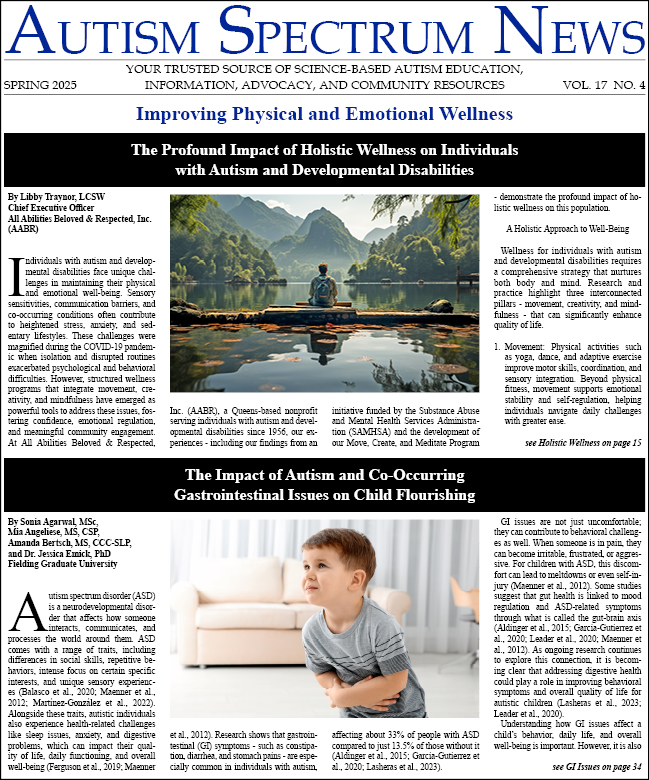-
Neurodiverse Couples: Making Meaningful Moments of Every Day – Having A Good Evening
Every night there are countless opportunities to create small connecting moments to enhance intimacy in a relationship. Especially after a long day, when partners are tired and out of gas, evenings can be a time when it’s easy to forget to acknowledge each other. Be intentional about having a...
-
A Wellness Incentive to Empower Health and Community
There is a plethora of research that has documented the importance of physical activity and wellness interventions specific to the neurodivergent population. A recent meta-analysis of 22 studies that included 763 young adults with ASD indicated that physical activity interventions improved the...
-
It’s Never Too Late to Communicate: Increasing Communication Access for Adults with Intellectual Disabilities and Autism
An estimated 5 million people in the United States are living with complex communication needs (CCN) (Beukelman & Light, 2020). This estimate includes people across all age groups and disability types who experience difficulties meeting their communication needs using only verbal speech....
-
A Presumption of Competence: Empowering Disability Advocacy and Independent Living
On June 18, 2024, the White House hosted an Olmstead 25th Anniversary Observance to commemorate the Supreme Court decision (Olmstead v. L.C.) that ruled institutionalizing people with disabilities who were capable of community living was a violation of the Americans with Disabilities Act (ADA). One...
-
What Neurodiversity Means to This Late-Identified Autistic Adult
I lived the first 40 years of my life as an autistic individual who didn’t know it yet. In a sense, lost because I lacked a complete picture of who I was. Confused because I faced too many questions as to why I was contending with challenges that were foreign to just about all of my peers, which...
-
Three Artists with Autism. Three Voices with Purpose: Laura Nadine, Blair Bunting, and Stuart Neilson
Artists invite their audiences into conversation. A piece of music, a photograph, a painting—each is a personal statement created to connect emotionally or intellectually with listeners and viewers. These expressions and the methods used to create them are shaped by lived experiences, some...
-
The Power of Person-Centered Planning in Supporting Autistic Adults
Everyone wants to be heard and supported in ways that truly resonate with them. For adults with autism, this means having a voice in how their lives are shaped, and person-centered planning is the key to making that happen. It’s a process that ensures individuals are at the heart of their own...
-
Diagnosis, Resources, and Behavior Changes – A Journey of Self-Discovery
Time changes our framing of incidents. When they go poorly, it’s not unusual to replay them in our minds in search of a more acceptable arc. This narrative is what I’ve learned from a situation that resolved well but which has also coughed up useful lessons. In the two or three years...
-
Creating Autism-Friendly Environments for Workplace Inclusivity
In an increasingly diverse and inclusive world, creating autism-friendly environments in the workplace is not just a noble endeavor but a practical necessity. Autism Spectrum Disorder (ASD) affects millions of people worldwide, and many of them possess unique skills and perspectives that can be...
-
Building Self-Advocacy Skills in Autistic Young Adults
Adulthood is the time when teachers and parents can no longer advocate for their children the same way they could during the school-age years. Much of it becomes the responsibility of the adult. At the beginning of my career, I had the opportunity to develop an evidence-based curriculum in...





